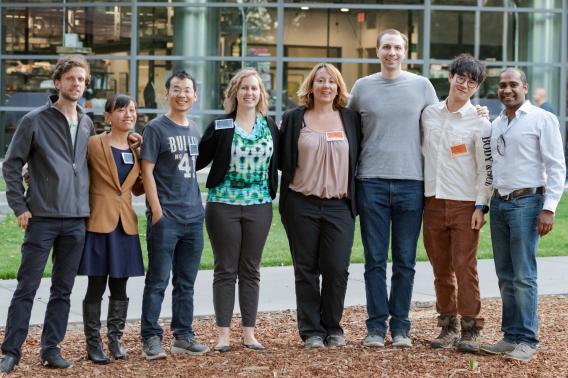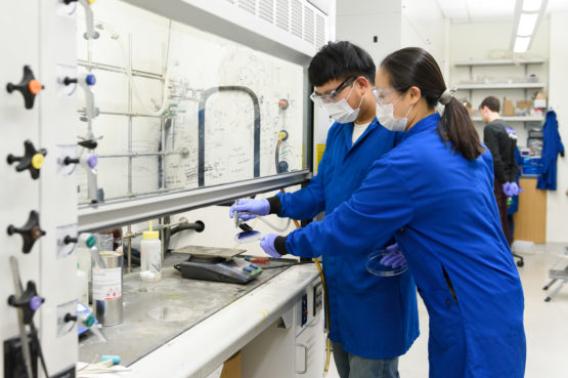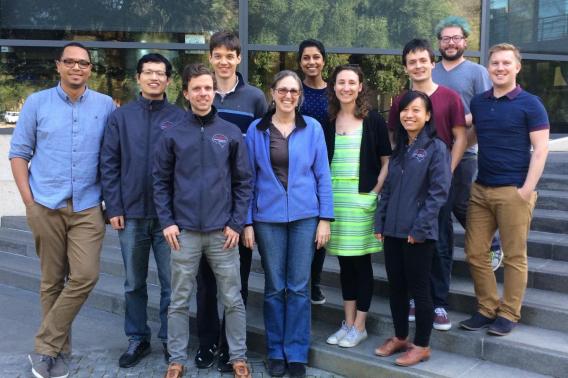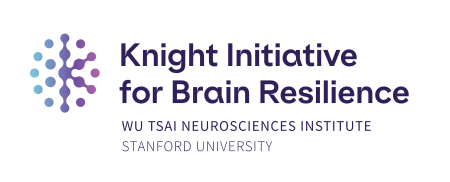Our postdoctoral scholars program provides research support and a community of mentors and peers to extraordinary Stanford postdocs advancing our understanding of the mind and brain in health and disease.
The Wu Tsai Neurosciences Institute's Postdoctoral Scholar Awards support innovative, collaborative and creative postdoctoral researchers from across Stanford who are pursuing novel, multi-disciplinary approaches to understanding the workings of the mind and brain. In addition to receiving research funding, scholars meet regularly for workshops, journal clubs and other activities that allow them to learn from one another’s varied research and personal backgrounds and establish community and collaborations. These Interdisciplinary and Brain Resilience Scholars will advance our knowledge of brain health and aging.
Program Tracks
Interdisciplinary Postdoctoral Scholar Award
Since 2015, the Wu Tsai Neuro's Interdisciplinary Scholars track has supported innovative young researchers with backgrounds in basic and clinical neurosciences, biomedical sciences, physical sciences, social sciences, engineering, education, law, business and humanities who are engaged in cutting edge interdisciplinary research in the neurosciences, broadly defined.
Brain Resilience Postdoctoral Scholar Award
Since 2023, the Brain Resilience Postdoctoral Scholars award of the Knight Initiative for Brain Resilience supports trainees generating paradigm-shifting insights on the mechanisms of neurodegeneration and how to maintain brain resilience into old age.
Application
Deadline to submit your application for the 2025 cohort is Monday, August 26, 2024.
Click here for application and eligibility details.
Program frequently asked questions (FAQs)
Program terms and conditions
Our Model
This program awards two years of fellowship funding and is pleased to provide parental leave. Postdoctoral scholars also receive $5,000 of discretionary research funds annually.
Mentorship
The program provides scientific and career-growth opportunities and guidance under the leadership of program co-directors and faculty mentors Professors Miriam Goodman and Liqun Luo. Scholars meet monthly with their cohort and program faculty mentors to share ideas and discuss approaches to scientific and career challenges, visit each other’s labs to learn about different research techniques and areas of study, and practice communicating their research to scientific and general audiences.
In addition, Brain Resilience Postdoctoral Scholars attend events and seminars hosted by the Knight Initiative for Brain Resilience, and are stewarded by Knight Initiative Associate Director Natasha Hussain and faculty mentor Elizabeth Mormino to learn from one another and build community around the topic of neurodegeneration and brain resilience.
Diversity
The Wu Tsai Neurosciences Institute Postdoctoral program brings together cohorts of postdocs representing the broad range of demographic, experiential and scientific diversity. Women and postdocs from groups underrepresented in the neurosciences are strongly encouraged to apply.
Learn more

Application and Eligibility Details
Carefully review the detailed information below if you are interested in applying to the Interdisciplinary Postdoctoral Scholars track or the Brain Resilience Postdoctoral Scholars track of the program.


Meet current and past scholars
Funded Interdisciplinary Postdoctoral Scholar projects
Accelerating maturation of 3D human brain organoid models to study human aging mechanisms.
Dr. Iram will use brain intrinsic and systemic regulators of aging, in an attempt to accelerate maturation of human-derived brain organoids. This has the potential to produce the first ever aged human brain 3D cultures and identify factors which accelerate brain aging.
Optogenetic screening of the gut-brain axis via an internal light source
The gut-brain axis is implicated in many essential physiological and psychological functions, ranging from feeding, emotion, motivation, to memory. As a critical component of the gut-brain axis, vagal sensory neurons exhibit distinct projection patterns to target specific visceral organs.
Determining the microstructural basis of diffusion MRI
The aim of this project is to improve the accuracy and reliability of dMRI fiber tracking through comparison with a gold standard that unambiguously relates the measured water diffusion patterns to the underlying tissue structure.
Reprogramming organismal lifespan through modulation of neuropeptidergic circuits
Aging is the number one risk factor for debilitating diseases such as neurodegeneration. Can manipulation of neurons in the brain alter the body’s physiological state to extend lifespan? Neuropeptides are key modulators of short-term homeostasis such as feeding, temperature, and sleep.



